The 2024 MLB season has been a rollercoaster, and while players and teams have had their moments of glory and defeat, the umpires have not been spared from scrutiny. With the introduction of new rules and the ever-present debate over robotic strike zones, the umpires have been under the microscope more than ever.
Using metrics from Ump Scorecards, we will discuss the performance of the umpires, focusing on their accuracy, consistency, and favoritism. Here’s a look at the 10 worst MLB umpires of 2024.
10. Angel Hernandez
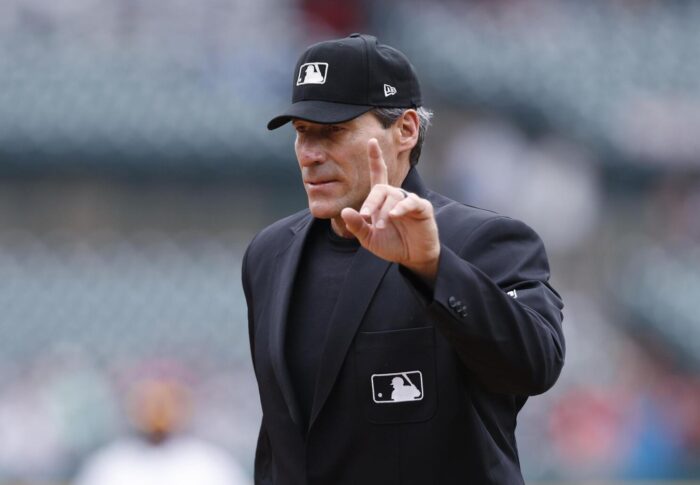
Source: apnews.com
Angel Hernandez is often cited as one of the most controversial umpires in MLB history. Despite being in the league for over three decades, Hernandez’s decisions have often been criticized. In the 2022 MLB season, he ranked 2nd in terms of the lowest average consistency.
Such stats are concerning, especially for an umpire with Hernandez’s experience. One of the main criticisms of Hernandez has been his decision-making in situations that aren’t related to home plate. Although he hasn’t umpired a World Series game since 2005, his name continues to be a talking point among baseball fans and analysts.
9. Doug Eddings
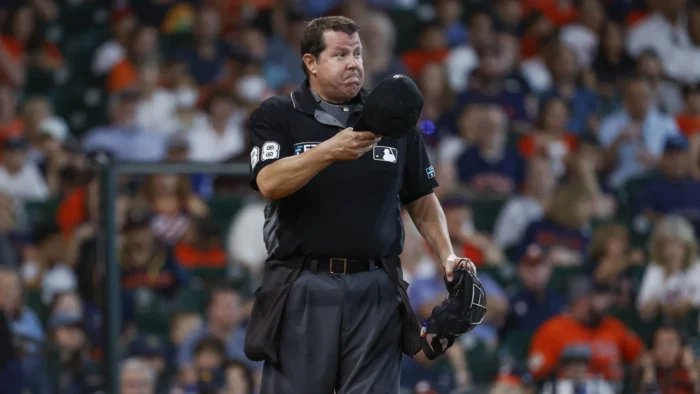
Source: yardbarker.com
With 24 MLB seasons under his belt, Doug Eddings is no stranger to the pressures of umpiring. However, his performance, especially in recent seasons, has been underwhelming. In a game between the Blue Jays and the White Sox, Eddings had a dismal 64% called strike accuracy.
Such stats are alarming, especially for an umpire with over two decades of experience. Eddings’ mistakes haven’t been limited to just one game. In another match against the Orioles, he made several questionable calls that left fans and players frustrated. With the introduction of new rules and the increasing demand for robotic strike zones, umpires like Eddings will need to up their game.
8. Dan Bellino
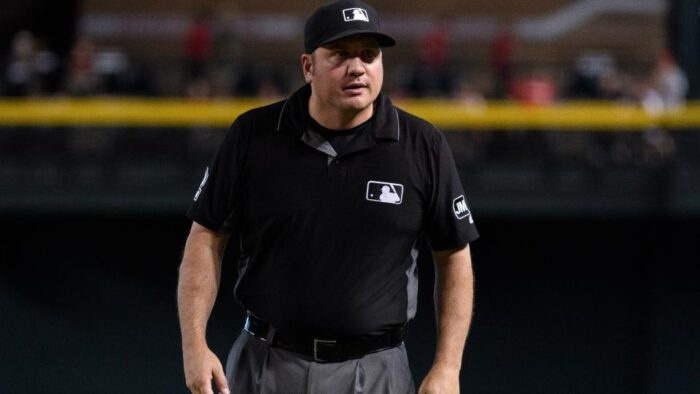
Source: sportingnews.com
Dan Bellino’s umpiring career has been marked by several controversial decisions. One of the most talked-about incidents involved Madison Baumgarner, which left many baseball fans and analysts riled up. Although Bellino later issued an apology, the damage was done, and the incident remains a stain on his record.
Bellino, who made his MLB debut in 2008, has been involved in other controversies as well. In 2016, he had a staredown with Blue Jays’ Jose Bautista, which didn’t sit well with many fans. Such incidents raise questions about the temperament and decision-making of umpires in high-pressure situations.
7. Brian O’Nora
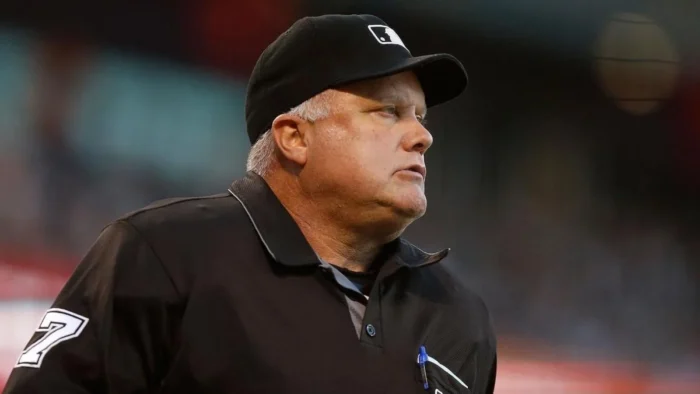
Source: cbsnews.com
Brian O’Nora’s umpiring decisions have raised eyebrows on more than one occasion. Despite making his MLB debut way back in 1992, O’Nora’s calls have often been questionable. One of the most notable incidents was during a Mets vs Braves game, where he called three consecutive pitches against Marcell Ozuna as strikes, even though they were all outside the zone.
Such decisions not only affect the outcome of the game but also the morale of the players. In the 2022 MLB season, O’Nora was responsible for nine out of the ten worst calls in a game between the Cincinnati Reds and the Milwaukee Brewers, achieving a correct call rate of only 83.5%. For an umpire with nearly three decades of experience, such performance is concerning.
6. Rob Drake
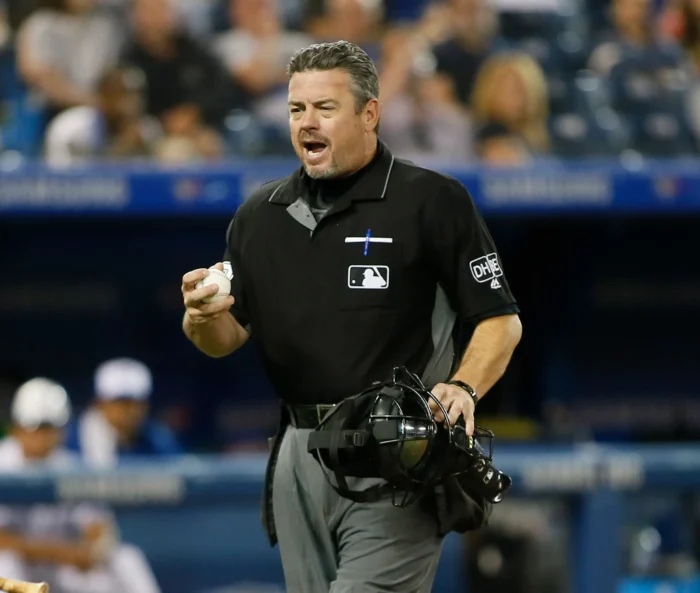
Source: usatoday.com
Rob Drake’s umpiring career has been filled with controversies. In 2022, he had one of the worst umpiring days in the Texas vs Blue Jays game, missing 21 calls with a correct call rate of just 86.5%.
Such performance is not expected from an umpire who made his MLB debut in 1999 and has officiated in four league championship series. Drake’s attitude has also been a point of contention. In a game between the Oakland Athletics and Baltimore Orioles, he made a controversial call against Mancini, leading to a heated exchange.
Both Mancini and his manager were ejected from the game. With such a track record, it remains to be seen if Drake can improve his performance and reputation in the coming seasons.
5. Laz Diaz
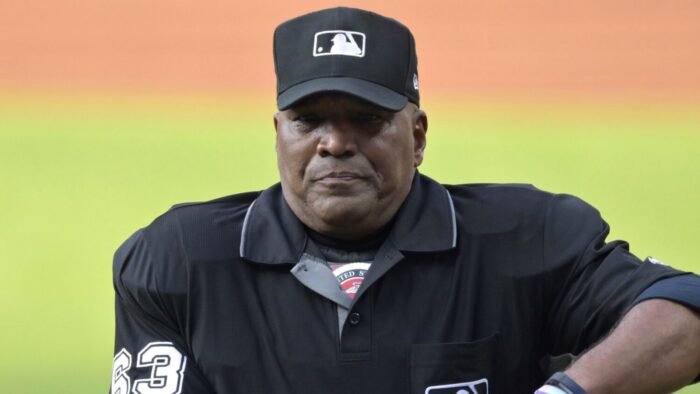
Source: larrybrownsports.com
Laz Diaz, a familiar name to Boston Red Sox fans, has been in the majors since 1995. His performance, especially in the 2022 MLB season, has been underwhelming. Diaz ranked 7th in terms of the lowest average consistency and 5th in lowest accuracy.
One of his most controversial calls came in a game between the Los Angeles Angels and Seattle Mariners, where he lost count and announced the call as 3-1 instead of 2-2. Such mistakes not only disrupt the flow of the game but also raise questions about the training and evaluation of MLB umpires. With the introduction of new rules and the debate over robotic strike zones, umpires like Diaz will be under more scrutiny in the coming seasons.
4. Ed Hickox
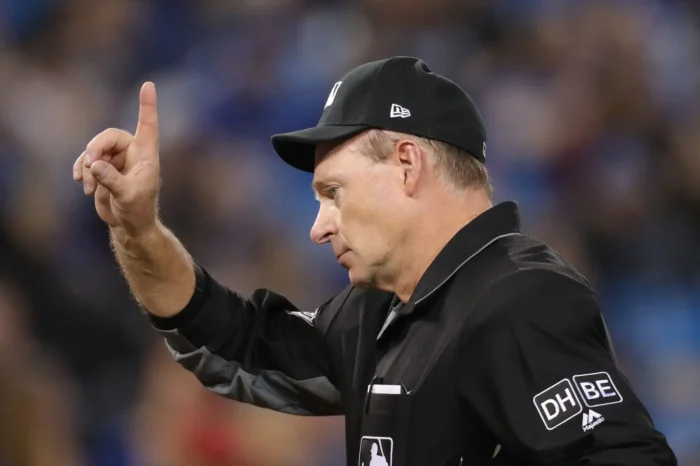
Source: barstoolsports.com
Ed Hickox’s umpiring in the 2022 MLB season left many fans and analysts scratching their heads. With 32 years of experience, one would expect Hickox to be among the best in the business. However, his performance in the Yankees vs Cardinal game was widely criticized.
He missed a call against Marwin Gonzalez on a pitch that was off by 4.19 inches. Such mistakes not only affect the outcome of the game but also the integrity of the sport. Hickox’s track record in the 2022 MLB season wasn’t impressive either.
He ranked 4th in the lowest average consistency and 5th in the lowest accuracy. Such stats are concerning for an umpire with over three decades of experience. The question remains: Will Hickox improve his performance in the upcoming seasons?
3. Dan Iassogna
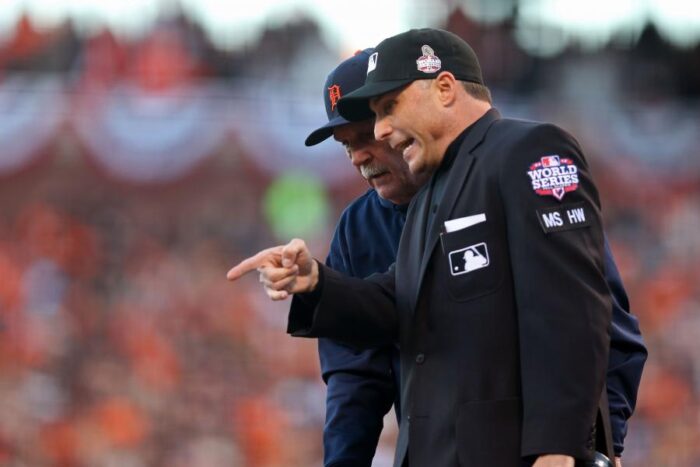
Source: bleacherreport.com
Dan Iassogna’s performance this season has solidified his reputation as one of the worst umpires in the game. In 22 graded games behind the plate, his accuracy is just 93.2%, and his CCAx is a concerning -25.5, making it the fourth worst in baseball.
He ranks low in various metrics, including the 22nd percentile in accuracy and 13th in accuracy above expected. A significant miss by Iassogna occurred on opening day when he missed a call by a whopping 6.24 inches. In another game between the Cincinnati Reds and the San Francisco Giants, he missed 13 calls, with ten going against the Reds.
Such performance raises questions about the training and evaluation of MLB umpires.
2. Ron Kulpa
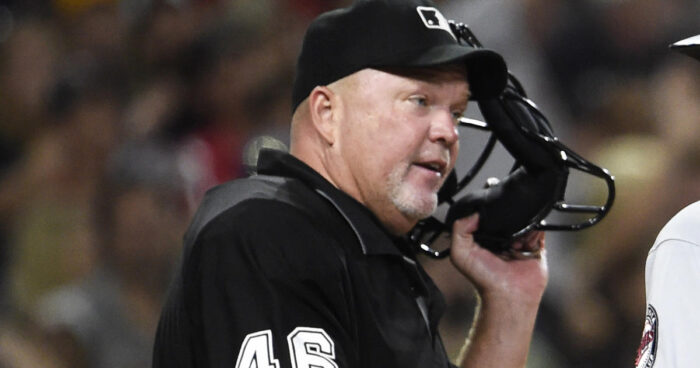
Source: cbsnews.com
Ron Kulpa’s umpiring decisions have had direct implications on game outcomes. A notable incident occurred during a game between the St. Louis Cardinals and another team. With bases loaded in the 8th inning, Kulpa made consecutive incorrect strike calls that should have resulted in a walk, tying the game for the Cardinals.
Instead, the inning ended in a double play, and the Cardinals lost by a single run. Such decisions not only affect the outcome of a single game but can have ripple effects on team morale, standings, and even playoff implications. Kulpa’s decisions have been under the scanner multiple times, with fans and analysts pointing out his errors.
1. Hunter Wendelstedt
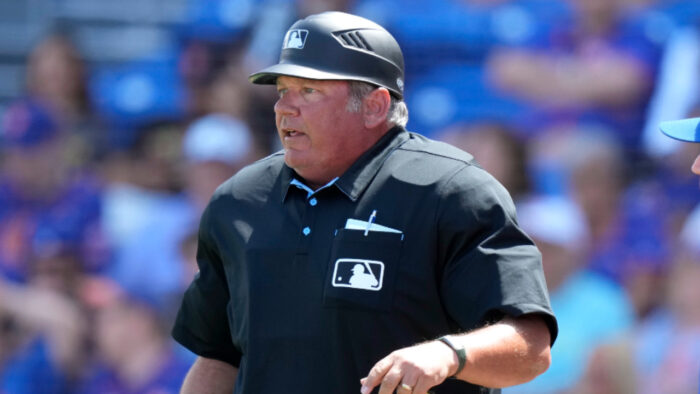
Source: sportsnet.ca
Hunter Wendelstedt has been a significant talking point this season, and not for the right reasons. His accuracy rate stands at a dismal 92.6%, the lowest among regular umpires. Furthermore, his CCAx (correct calls above expected) is the worst at -40.6.
This means he gets a significant number of calls wrong, especially when compared to what’s expected of an umpire at this level. In June, Wendelstedt made a glaring error by calling a strike that was low by 5.56 inches, marking the worst miss on a low pitch for the season.
His performance metrics are concerning, with rankings in the third percentile for accuracy and fourth for accuracy above expected. What’s even more alarming is his temperament. Wendelstedt is quick to confront anyone who questions his calls, making him a controversial figure on the field.
Despite his track record, Wendelstedt has officiated in four League Championship Series and a World Series, raising questions about the criteria for umpire assignments in crucial games.
FAQs
How are umpires evaluated for their performance during the MLB season?
Umpires are evaluated based on several metrics, including their accuracy in making calls, consistency across games, and their ability to handle high-pressure situations.
They are also reviewed based on feedback from teams, players, and other umpires. Video replay analysis is often used to assess the correctness of their decisions.
Are there any training programs or courses for aspiring MLB umpires?
Yes, there are professional umpire training schools that aspiring MLB umpires can attend. These schools provide intensive training programs that cover the rules of baseball, on-field mechanics, and game management.
Graduates often start in the minor leagues and work their way up to the MLB based on their performance.
With the rise of technology, is there a possibility of robotic umpires replacing human umpires in the future?
The debate over robotic umpires, especially for ball-strike calls, has been ongoing. While technology like the Automated Ball-Strike System (ABS) has been tested in minor leagues, MLB has not yet fully adopted it.
While technology can assist human umpires, the complete replacement of human judgment with robots remains a contentious issue.
How do umpires handle the stress and pressure, especially after making a controversial call?
Umpires undergo psychological training to handle the pressures of the job. They are trained to stay calm under pressure, avoid confrontations, and focus on the game.
Many umpires also rely on peer support, discussing challenging situations with fellow umpires to learn and improve.
Are umpires penalized or demoted for consistently poor performance?
Yes, just like players, umpires can face consequences for poor performance. This can range from not being assigned to high-profile games or playoff series to demotions or even removal from the MLB umpire roster.
Continuous training and evaluations ensure that only the best umpires officiate at the MLB level.
How has the introduction of the video replay review system impacted the role of umpires?
The introduction of the video replay review system has added an additional layer of scrutiny to umpires’ decisions. While it provides a safety net to correct potentially game-changing errors, it also emphasizes the importance of getting calls right the first time. Some argue it has made the umpire’s job more challenging, while others believe it upholds the game’s integrity.
Final Words
Umpiring in Major League Baseball is a demanding and high-pressure role, requiring split-second decisions that can significantly impact the outcome of a game. While every umpire strives for perfection, mistakes are inevitable.
The 2024 MLB season has seen its fair share of controversial calls, with some umpires facing more criticism than others. This list, based on data and fan reactions, highlights those who have had a particularly challenging year.
However, it’s essential to remember that every umpire has had moments of excellence and that the job’s nature means they are always under intense scrutiny. As technology continues to evolve and the debate over robotic strike zones intensifies, the role of the umpire will undoubtedly continue to be a topic of discussion among fans, players, and analysts alike. We’ve also ranked the 20 best MLB players in 2024, so make sure to check it out!
